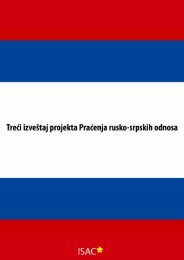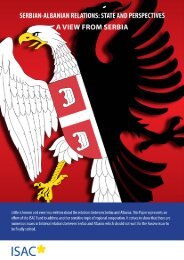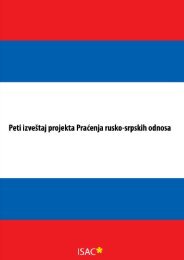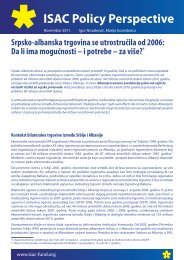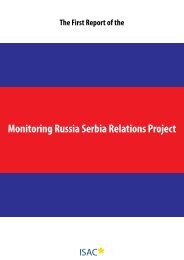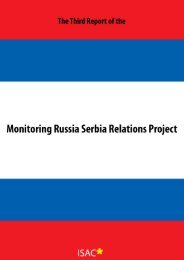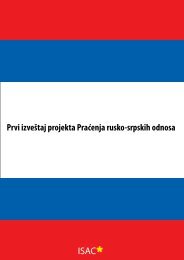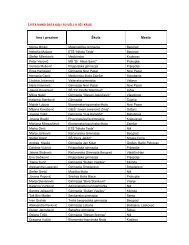the process of security sector reform - ISAC Fund
the process of security sector reform - ISAC Fund
the process of security sector reform - ISAC Fund
Create successful ePaper yourself
Turn your PDF publications into a flip-book with our unique Google optimized e-Paper software.
Narcís Serra TRANSITION TO DEMOCRACY AND MILITARY REFORM: POSSIBLE FRAMEWORK<br />
Narcís Serra TRANSITION TO DEMOCRACY AND MILITARY REFORM: POSSIBLE FRAMEWORK<br />
fully institutional, and, even less so, fully occupational. The Spanish experience,<br />
as well as that <strong>of</strong> o<strong>the</strong>r sou<strong>the</strong>rn European countries, indicates that <strong>the</strong> change to<br />
democratic pr<strong>of</strong>essionalism cannot be achieved without a shift from positions<br />
akin to an institutional army to more occupational positions, <strong>the</strong> impetus for<br />
which must come from civil authority. Movement in that direction can come<br />
through a diversity <strong>of</strong> measures. As examples, we can cite encouraging military<br />
personnel to live in ordinary houses in any town or city instead <strong>of</strong> special military<br />
barracks, <strong>the</strong> establishment <strong>of</strong> mechanisms <strong>of</strong> promotion that reward lifelong<br />
training and preparation, <strong>the</strong> elimination <strong>of</strong> indirect forms <strong>of</strong> retribution such as<br />
special supermarkets or o<strong>the</strong>r benefits not included in salaries, <strong>the</strong> establishment<br />
<strong>of</strong> working hours similar to those <strong>of</strong> any ordinary working day, <strong>the</strong> introduction <strong>of</strong><br />
women in <strong>the</strong> army, <strong>the</strong> change in training plans, <strong>the</strong> introduction <strong>of</strong> <strong>the</strong> defence<br />
<strong>of</strong> human rights in training plans, tight control to oversee <strong>the</strong> proper treatment <strong>of</strong><br />
soldiers and cooperation with different international <strong>security</strong> bodies.<br />
Civil control <strong>of</strong> <strong>the</strong> armed forces in this phase <strong>the</strong>refore requires action with<br />
regard to <strong>the</strong> very concept <strong>of</strong> <strong>the</strong> military pr<strong>of</strong>ession, which is no longer exclusively<br />
defined by <strong>the</strong> military <strong>the</strong>mselves, in order to be adapted to present<br />
circumstances through a policy deliberately applied from <strong>the</strong> government. The<br />
introduction <strong>of</strong> new missions to give more reasons <strong>of</strong> existence to <strong>the</strong> armed<br />
forces contributes to this change in <strong>the</strong> pr<strong>of</strong>essional content necessary for <strong>the</strong><br />
establishment <strong>of</strong> civil-military relations in democracy.<br />
Definition <strong>of</strong> new missions.<br />
The definition <strong>of</strong> <strong>the</strong> missions to be carried out in <strong>the</strong> present circumstances is a<br />
question that has to be addressed given that with <strong>the</strong> new international situation<br />
<strong>the</strong> missions carried out thus far by armies in most countries have been placed in<br />
a situation <strong>of</strong> crisis, since this new international situation has meant <strong>the</strong> practical<br />
disappearance <strong>of</strong> conflicts between states. All <strong>of</strong> that has created a situation <strong>of</strong><br />
perplexity and lack <strong>of</strong> definition in which armies have tended towards internal<br />
actions in a bid to find justification for <strong>the</strong>ir existence.<br />
It isn’t <strong>the</strong> case <strong>of</strong> Serbia, which has lived through a very long interstate conflict,<br />
and which is a clear paradigm <strong>of</strong> what has been called new wars. For that<br />
reason, a political debate is necessary in order to properly define <strong>the</strong>se missions;<br />
it should not be done precipitatedly. The recent “Strategic Concept” approved<br />
in Spain shows how far this country has come; it has established only three<br />
missions: defence <strong>of</strong> territorial integrity within <strong>the</strong> framework <strong>of</strong> <strong>the</strong> EU and<br />
NATO; contributing to international peace operations; and <strong>the</strong> cooperation<br />
deemed necessary in operations <strong>of</strong> civil <strong>security</strong>, such as control by sea <strong>of</strong> ships<br />
that are likely to be transporting drugs, <strong>of</strong> safety and rescue operations, in natural<br />
disasters, etc.<br />
The missions must be decided by <strong>the</strong> government, with <strong>the</strong> necessary legislative<br />
backing wherever possible. Missions linked to domestic <strong>security</strong> must be<br />
temporary, not permanent, support to <strong>the</strong> police forces, should be carried out<br />
under civil control and subject to civil legislation.<br />
In <strong>the</strong> event <strong>of</strong> cooperation in domestic <strong>security</strong> tasks, <strong>the</strong>re must be a limit that<br />
must not be transgressed: <strong>the</strong>re must be no actions that demand or justify tasks<br />
<strong>of</strong> interior intelligence, vigilance or information about citizens.<br />
THE THIRD PHASE: CONSOLIDATED DEMOCRACY<br />
In this stage, civil control refers to <strong>the</strong> definition <strong>of</strong> <strong>the</strong> field <strong>of</strong> autonomy<br />
considered convenient by each government for adapting armed forces to <strong>the</strong><br />
domestic and international reality <strong>of</strong> our day, which is undergoing constant<br />
changes. Civil control <strong>of</strong> <strong>the</strong> armed forces is not stably resolved as a problem<br />
between two agents. If we don’t introduce <strong>the</strong> society and provide social support<br />
for progressive formulae <strong>of</strong> what can be termed democratic normalisation, we<br />
cannot design any stable framework for <strong>the</strong> solution <strong>of</strong> <strong>the</strong> problem <strong>of</strong> military<br />
control. None <strong>of</strong> that is easy against a backdrop <strong>of</strong> <strong>the</strong> still unresolved conflicts<br />
that have plagued <strong>the</strong> former Yugoslavia. The definition <strong>of</strong> missions that are<br />
accepted by citizens is ano<strong>the</strong>r important challenge.<br />
In this sense, international projection or <strong>the</strong> creation <strong>of</strong> measures <strong>of</strong> confidence<br />
with neighbours become <strong>the</strong> normal elements for <strong>the</strong> instrumentation <strong>of</strong> military<br />
policy in countries that have reached this stage.<br />
To summarise, <strong>the</strong> <strong>reform</strong> <strong>of</strong> <strong>the</strong> military in a transition to a democracy is indeed<br />
a long <strong>process</strong> that will take, at least, a decade to be completed. Moreover, <strong>the</strong><br />
<strong>reform</strong> has to be taken step by step, in a continuous manner. That is why tenacity<br />
becomes not only a convenient virtue but almost a necessary requirement. To<br />
succeed at each stage <strong>of</strong> <strong>the</strong> <strong>process</strong> is essential to be able to reach <strong>the</strong> final target,<br />
38 39



